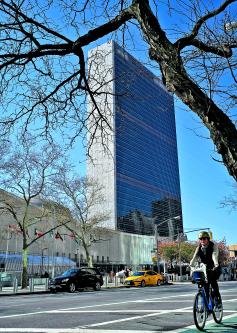Taiwanese tourists visiting New York are being denied entry to the UN headquarters, a Washington conference was told on Wednesday.
The conference heard it was a new development and most likely the result of “interference” from China.
“I have learned that people from Taiwan who were in New York and visiting the UN building — they simply wanted to take a tour — were turned away, because they were showing their ROC [Republic of China] passports,” China Power Project at the Center for Strategic and International Studies director Bonnie Glaser said.
She told the Heritage Foundation conference on “Taiwan in International Organizations” that the tourists were probably students.
“It makes you understand why, particularly youth in Taiwan, are increasingly hostile toward China,” Glaser said. “The Chinese have obviously gone through their own channels to put pressure on the UN.”
While it was not possible to determine exactly when the UN decided to turn away Taiwanese visitors, attendees at the conference said they believe it happened after the election of President Tsai Ing-wen (蔡英文) in January.
“This is relatively new. I hear it started earlier this year, probably around the time of the election in Taiwan — I don’t think this is something that has happened in the past,” Glaser said.
“We need to have quiet conversations to get a better fix on what happened, why it happened and see if it can be reversed,” former managing director of the American Institute in Taiwan (AIT) Barbara Schrage said.
Michael Mazza, a research fellow in foreign and defense policy studies at the American Enterprise Institute, described the incident as an example of “absurd behavior.”
“We are currently unable to verify the specific incident regarding the Taiwanese students,” UN Secretary-General Ban Ki-moon’s spokesperson Devi Palanivelu told the Taipei Times.
She referred the Taipei Times to the UN Web site where it states under the heading “New UN Access” that all visitors to the global body 18 years and older now require a government-issued photo identification issued by a member or an observer state to enter UN headquarters.
The Taipei Times was not able to determine exactly when the regulation went into force.
Glaser told the Heritage conference that Taiwan was excluded from many international organizations due to interference from Beijing.
“Every Chinese diplomat is tasked to impede, block and hamper Taiwan’s international space whenever there is an opportunity. Even when Ma Ying-jeou (馬英九) was president, that instruction to Chinese foreign ministry officials did not change,” she said. “China’s neuralgia about the danger of Taiwan’s independence has resulted in a campaign to snuff out Taiwan’s voice everywhere and anywhere that it appears.”
Glaser said that by taking these actions, China was harming relations with Taiwan and its people, even as it claimed to want to win over their hearts and minds.
She said that a good way to approach the problem of Taiwanese visitors being refused entry into the UN might be to hold “quiet discussions” with members of the UN and with Ban.
“I do think we have to push back and not simply look the other way and maybe this is something that if it is not done too publicly we could influence how the UN is operating on this,” Glaser said.
Source: Taipei Times - 2016/06/17





















